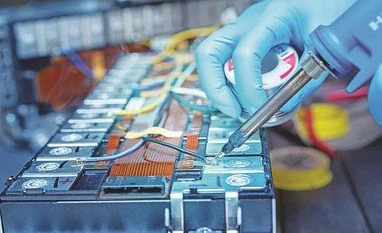The Centre has kick-started the auction process for the final 10 gigawatt-hour (GWh) of the Advanced Chemistry Cell (ACC) Production-Linked Incentive (PLI) scheme designated for grid-scale battery storage.
Although this allocation falls under the Ministry of New and Renewable Energy (MNRE), the Ministry of Heavy Industries (MHI) will conduct the auction, Business Standard has learnt.
The MHI plans to consult with industry stakeholders and government bodies, including NITI Aayog, the Ministry of Power, and MNRE, over the coming month to ensure a smooth auction process and enhance India’s ACC manufacturing capabilities.
“MHI will oversee the auction of the last remaining ACC PLI capacity. The ministry intends to hold an industry consultation round within a month,” a senior government official said.
A query sent to MHI remained unanswered until the time of going to press.
In June 2021, MHI launched the Rs 18,100 crore ACC PLI scheme with a total capacity of 50 GWh. The scheme aims to boost domestic manufacturing, create demand for battery storage for both electric vehicles (EVs) and stationary applications, and develop a comprehensive domestic supply chain while attracting foreign direct investment to India.
It is expected to accelerate EV adoption, potentially resulting in savings of $25 billion to $30 billion on oil imports over the programme’s duration and increase the share of renewable energy in the national grid, the ministry had said during the scheme’s launch.
In 2022, the auction concluded with Hyundai Global Motors receiving 20 GWh, Ola Electric being allocated 20 GWh, Rajesh Exports getting 5 GWh, and Reliance New Energy Solar being assigned 5 GWh. However, MHI had to rescind the 20 GWh allocated to Hyundai Global Motors after Hyundai Motor Company publicly distanced itself from Hyundai Global Motors in August 2022, stating that the latter was unauthorised to use the Hyundai trademark and logo.
Of the 20 GWh initially assigned to Hyundai Global Motors, 10 GWh was reallocated for grid-scale battery storage at the request of MNRE. Earlier this month, MHI concluded the auction for the remaining 10 GWh, which was awarded to Reliance Industries (RIL).
Given MHI’s expertise in conducting auctions and its role as the nodal ministry for the PLI scheme, it has been assigned to manage the auction process for the remaining grid-scale battery storage capacity, another government official said.
Grid-scale battery storage systems are crucial for balancing supply and demand, storing excess renewable energy, and providing backup during peak times or outages. India’s battery energy storage capacity increased more than fourfold to 219 megawatt-hour (MWh) by March 2024, up from 47.6 MWh a year earlier, according to Mercom Capital Group.
Major players in India’s grid-scale battery storage and related technologies include RIL, Tata Power, Adani Group, JSW Energy, and state-owned NTPC.
The PLI scheme aims to reduce import dependency, lower battery energy storage system (BESS) costs, and support the country’s energy transition goals. India aims to achieve 500 GW of installed renewable energy capacity by 2030 and reach net zero by 2070.
To further support battery storage affordability, the government has approved a viability gap funding scheme for establishing 4,000 MWh of BESS. This scheme offers up to 40 per cent capital cost funding, which is expected to reduce the cost of electricity from BESS.
Former Union Minister of Power and New and Renewable Energy R K Singh said in December last year that the recent tariff-based competitive bid by the Solar Energy Corporation of India for a 500 MW/1,000 MWh BESS discovered the cost of energy storage to be Rs 10.18 per kilowatt-hour.
The PLI scheme, which provides financial incentives, aims to further reduce the cost of energy storage, decrease dependency on battery imports, and establish India as a global battery manufacturing hub.
Initial allocations (2022)
· Hyundai Global Motors: 20 GWh
· Reliance New Energy Solar: 5 GWh
• The 20 GWh allocated to Hyundai Global Motors was rescinded after Hyundai Motor Company publicly distanced itself from Hyundai Global Motors in August 2022 due to the unauthorised use of the Hyundai trademark
)

)

















